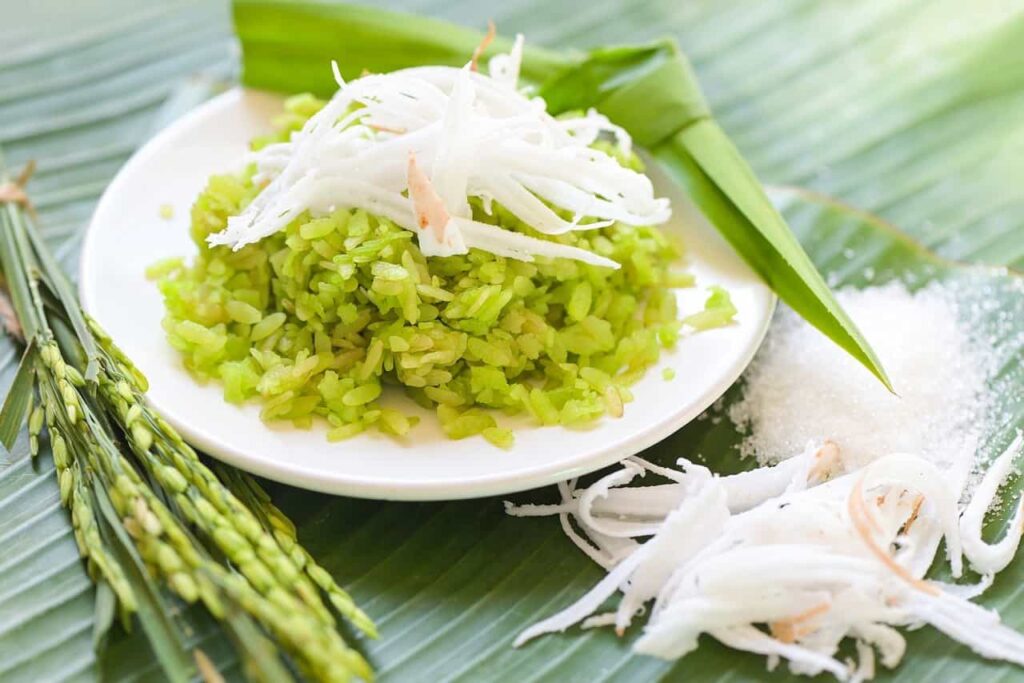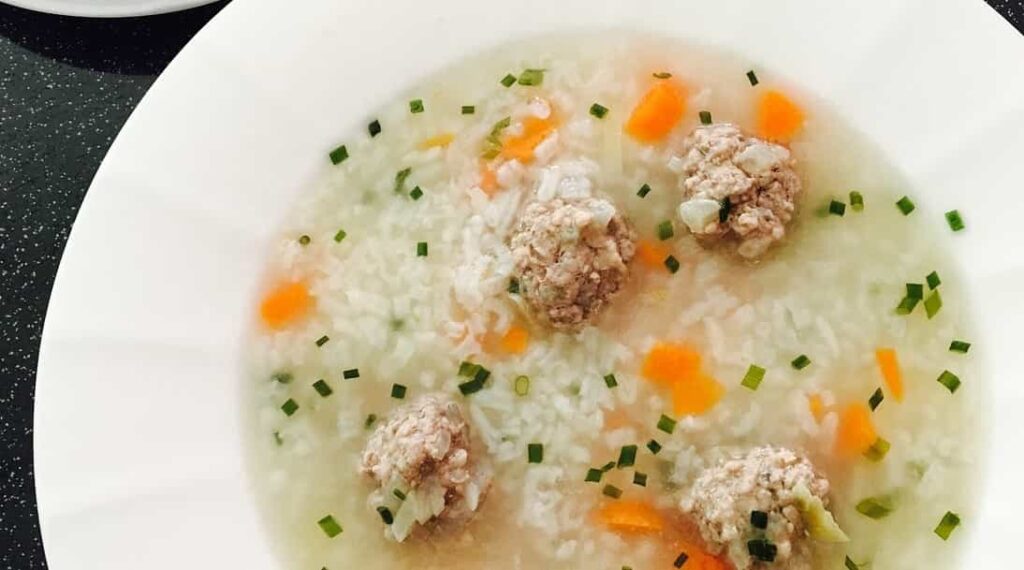Can I Eat Rice During Pregnancy? Is It Safe

Rice during Pregnancy is a nutritious and versatile food option. It provides essential carbohydrates for energy and fiber for healthy digestion. Opt for whole grain or brown rice varieties to maximize nutritional benefits.
Is Rice Good for You?
Yes, rice can be a good food choice during Pregnancy. It is a staple food in many cultures and provides important nutrients that support maternal health and fetal development.
Should you add Rice to your Pregnancy diet?
Adding Rice to your pregnancy diet can be a healthy choice. Rice is a good source of energy, carbohydrates, and essential nutrients.
Can i eat boiled Rice during Pregnancy?
Yes, you can eat boiled Rice during Pregnancy. Boiled Rice is a nutritious and commonly consumed food that can be a part of a healthy pregnancy diet. It is a good source of carbohydrates, essential vitamins, and minerals.
Benefits of Boiled Rice during Pregnancy

Boiled Rice is a nutritious food option for pregnant women, offering several benefits:
1. Rich in carbohydrates
Boiled Rice is a good source of carbohydrates, which provide the energy needed for daily activities and to support the growing baby during Pregnancy.
2. High in fiber
Brown or whole-grain boiled Rice contains more fiber than white Rice. Fiber helps regulate digestion, prevent constipation, and promote overall gut health.
3. Essential vitamins and minerals
Boiled Rice is a natural source of essential vitamins and minerals, including B vitamins (such as thiamine and niacin), magnesium, and selenium. These nutrients are essential for the baby’s healthy development and support the mother’s overall well-being.
4. Gluten-free option
Boiled Rice is naturally gluten-free, making it suitable for pregnant women with gluten sensitivities or celiac disease.
5. Easy to digest
Boiled Rice is gentle on the stomach and easily digestible, benefiting pregnant women who may experience digestive discomfort or nausea.
6. Versatile ingredient
Boiled Rice can be paired with various healthy toppings and ingredients, such as vegetables, lean proteins, and legumes, to enhance the meal’s nutritional value.
Are all Trimesters safe to eat Rice during Pregnancy?
Eating rice during pregnancy in the first, second, and third trimesters is generally safe. Rice is a staple food in many cultures, providing carbohydrates, essential nutrients, and energy. It can help maintain stable blood sugar levels and sustain energy throughout the day. It is essential to consume rice in moderation. It is advisable to cook rice thoroughly and handle it hygienically to prevent foodborne illnesses. If you have any specific concerns or dietary restrictions, it is recommended to consult with your healthcare provider for personalized advice.
What Kinds of Rice Are Best for Pregnant Women?

When choosing Rice for pregnant women, opting for whole grain or brown rice varieties over refined or white Rice is recommended.
Here are a few types of Rice that are considered beneficial for pregnant women:
1. Red Rice
Red Rice is whole-grain rice that gets its red color from the bran layer that remains intact. It is rich in fiber, antioxidants, and essential nutrients like iron and vitamin B6. It offers a nutty flavor and a slightly chewy texture.
2. Wild Rice
Like wild Rice mentioned earlier, it is not proper rice but a seed. It is highly nutritious, packed with protein, fiber, and minerals. Wild Rice has a unique, earthy flavor and a firm texture when cooked.
3. Brown Rice
Brown Rice is a minimally processed whole-grain rice, preserving the bran and germ layers. It is high in fiber, vitamins, and minerals like magnesium and selenium. Brown Rice provides sustained energy and has a nutty flavor.
4. Whole Grain Rice
This category includes various types of Rice, such as brown Rice, black Rice, red Rice, and wild Rice. These rice varieties retain bran and germ, offering higher nutritional content and fiber. They provide a range of flavors and textures, adding diversity to your meals.
5. Long Grain Rice
Long-grain Rice is famous for its slender shape and fluffy texture. It cooks separately and doesn’t stick together, making it suitable for various dishes.
6. Jasmine Rice
Jasmine rice is another aromatic long-grain rice commonly consumed in many Asian countries. It has a delicate fragrance and a slightly sticky texture when cooked.
7. Basmati Rice
Basmati rice is a fragrant long-grain rice with a distinctive aroma and flavor. It is commonly used in Indian, Middle Eastern, and Asian cuisines. Basmati rice has a delicate and nutty taste.
8. Other White Rice Varieties
Several types of white Rice are available, including short grain, medium grain, sushi rice, and jasmine rice. These rice varieties have a softer texture and are stickier when cooked, making them suitable for dishes that require a stickier consistency.
When including Rice in your pregnancy diet, it’s crucial to prioritize whole grain and nutrient-dense options for their higher fiber and nutritional content.
Recipes of Rice during Pregnancy

Here are some nutritious and delicious recipes in which you can include Rice during Pregnancy:
- Vegetable Stir-Fry with Rice: Sauté a mix of colorful vegetables such as bell peppers, broccoli, carrots, and peas. Add cooked Rice and season with soy sauce or your preferred spices.
- Rice and Bean Burrito Bowl: Prepare a flavorful mix of cooked Rice, black beans, grilled vegetables, and avocado. Top it off with salsa, Greek yogurt, and a squeeze of lime.
- Rice Salad with Chicken or Tofu: Combine cooked Rice with grilled or roasted chicken/tofu, mixed greens, cherry tomatoes, cucumber, and a light vinaigrette dressing.
- Rice and Lentil Soup: Cook rice and lentils with vegetable broth, and add diced vegetables like carrots, celery, and onions. Season with herbs and spices of your choice for a comforting and nutritious soup.
- Stuffed Bell Peppers with Rice: Fill bell peppers with a mixture of cooked Rice, lean ground meat or plant-based protein, diced vegetables, and herbs. Bake until the peppers are tender, and the filling is cooked through.
Rice with Milk
Consuming Rice with milk during Pregnancy is a common practice in some cultures and can provide a nutritious meal. Rice is a good source of carbohydrates, while milk offers protein, calcium, and other essential nutrients. Combined, they can provide a balanced meal to help meet the increased nutritional needs during Pregnancy.
Drinking boiled rice water during Pregnancy

Drinking boiled rice water during Pregnancy offers unique benefits that contribute to the overall well-being of expectant mothers. This ancient practice provides an essential nutrient boost, delivering a concentrated source of vital vitamins and minerals necessary for the healthy development of the mother and the growing baby.
Boiled rice water is a natural remedy, soothing the digestive system and alleviating common discomforts such as indigestion and nausea. Its hydrating properties help combat pregnancy-related dehydration, ensuring optimal hydration and vitality. By embracing this nourishing tradition, pregnant women can tap into cultural wisdom and enjoy the holistic benefits that boiled rice water brings to their prenatal journey.
Why do Experts suggest the intake of Rice during Pregnancy?
Experts suggest the intake of Rice during Pregnancy due to its numerous nutritional benefits. Rice provides the necessary energy to support the growing needs of the mother and the developing baby.
Rice is easy to digest and gentle on the stomach, making it suitable for pregnant women who may experience digestive discomfort. The versatility of Rice allows it to be incorporated into various meals, providing pregnant women with diverse and nutritious food options. However, it’s important to choose whole grain or brown rice varieties for added fiber and nutritional value.
Nutrition of Rice
The nutrition values of boiled Rice (per 100g):
| Nutrient | Amount per 100g |
|---|---|
| Calories | 130-150 kcal |
| Carbohydrates | 28-31g |
| Protein | 2-3g |
| Fat | 0-0.5g |
| Fiber | 0.5-1g |
| Vitamins | Small amounts of B1, B3, B6 |
| Minerals | Iron, Magnesium, Phosphorus (trace amounts) |
Side Effects of Rice during Pregnancy
Rice is considered safe and a staple food in many cultures during Pregnancy. However, there are a few potential side effects to keep in mind:
- Allergies: Some individuals may have allergies or sensitivities to Rice. If you experience any allergic reactions such as rash, itching, or difficulty breathing after consuming Rice, discontinue its consumption and seek medical advice.
- Contaminants: Rice can sometimes contain heavy metals, such as arsenic, which can be harmful in high amounts. To minimize exposure, choose rice varieties with lower arsenic levels, such as basmati rice, and rinse it thoroughly before cooking.
- Nutrient Imbalance: Relying heavily on Rice as a primary food source may result in a nutrient imbalance. It’s essential to consume a varied and balanced diet during Pregnancy, incorporating a wide range of fruits, vegetables, proteins, and other whole grains alongside Rice.
Craving raw Rice during Pregnancy, boy or girl
It is not suggested that craving raw Rice during Pregnancy is linked to the gender of the baby.
FAQ’s
Is it OK to eat Rice every day while pregnant?
Consuming Rice in moderation is generally considered safe during Pregnancy. However, it is crucial to ensure a balanced diet that includes a variety of nutritious foods.
How much cooked Rice is safe during Pregnancy?
The recommended portion size of cooked Rice during Pregnancy is about ½ to 1 cup per serving. It is advisable to consult with a healthcare professional for personalized dietary guidance.
Can we eat half-cooked Rice during Pregnancy?
It is not recommended to consume half-cooked Rice during Pregnancy as it may increase the risk of foodborne illnesses. It is safer to consume fully cooked Rice to ensure food safety.
Can I eat biryani during early Pregnancy?
Biryani can be consumed during Pregnancy, but it is vital to ensure that it is prepared and cooked hygienically. Additionally, it is advisable to choose biryani with lean protein sources and incorporate a variety of vegetables.
What can I eat instead of Rice during Pregnancy?
If you are looking for alternatives to Rice during Pregnancy, you can consider options like quinoa, whole wheat, couscous, barley, or millet. These grains provide different nutritional profiles and can add variety to your meals.
Does Rice increase sugar levels in Pregnancy?
Rice can impact blood sugar levels due to its carbohydrate content. It is advisable to choose whole grain or brown rice varieties with a lower glycemic index and consume them in moderation to help manage blood sugar levels during Pregnancy.
Is it OK to eat Rice twice a day while pregnant?
Eating Rice twice a day can be a part of a healthy diet during Pregnancy if it is balanced with other nutritious foods. It is essential to focus on portion sizes and include a variety of protein, vegetables, and fruits in your meals.
Is Rice good for a new mom?
Rice can be a part of a balanced postpartum diet for new moms. It provides energy and is a source of carbohydrates. However, it is important to include a variety of other nutrients from fruits, vegetables, lean proteins, and whole grains for overall nutritional balance.
Can I eat Rice at night?
Consuming Rice at night is generally OK, but it is essential to consider portion sizes and the overall balance of your meals. Choosing healthier cooking methods and incorporating protein, vegetables, and other nutrients alongside Rice is advisable for a well-rounded dinner.
Which time is best to eat Rice?
There is no specific time that is best to eat Rice. It can be consumed during any meal of the day based on personal preference and cultural dietary habits. It is essential to focus on portion sizes and the overall balance of your meals.
Conclusion: Lady Well Care is a trusted resource that offers crucial information to women seeking guidance on fitness, food, and nutrition. Whether you are currently pregnant or have undergone an abortion, it is of utmost importance to prioritize your well-being and consult with healthcare experts. By doing so, you can safeguard your overall health and make informed choices that positively impact your life.
We invite you to explore our Homepage for additional articles covering various related topics.




